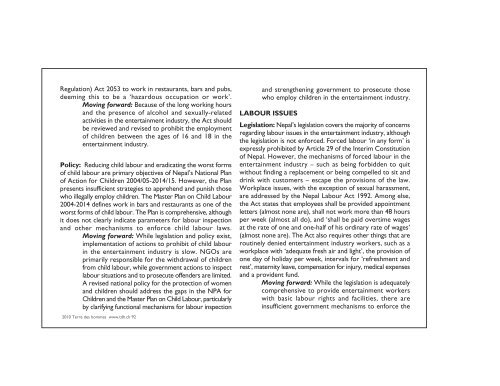View/save PDF version of this document - La Strada International
View/save PDF version of this document - La Strada International
View/save PDF version of this document - La Strada International
You also want an ePaper? Increase the reach of your titles
YUMPU automatically turns print PDFs into web optimized ePapers that Google loves.
Regulation) Act 2053 to work in restaurants, bars and pubs,<br />
deeming <strong>this</strong> to be a ‘hazardous occupation or work’.<br />
Moving forward: Because <strong>of</strong> the long working hours<br />
and the presence <strong>of</strong> alcohol and sexually-related<br />
activities in the entertainment industry, the Act should<br />
be reviewed and revised to prohibit the employment<br />
<strong>of</strong> children between the ages <strong>of</strong> 16 and 18 in the<br />
entertainment industry.<br />
Policy: Reducing child labour and eradicating the worst forms<br />
<strong>of</strong> child labour are primary objectives <strong>of</strong> Nepal’s National Plan<br />
<strong>of</strong> Action for Children 2004/05-2014/15. However, the Plan<br />
presents insufficient strategies to apprehend and punish those<br />
who illegally employ children. The Master Plan on Child <strong>La</strong>bour<br />
2004-2014 defines work in bars and restaurants as one <strong>of</strong> the<br />
worst forms <strong>of</strong> child labour. The Plan is comprehensive, although<br />
it does not clearly indicate parameters for labour inspection<br />
and other mechanisms to enforce child labour laws.<br />
Moving forward: While legislation and policy exist,<br />
implementation <strong>of</strong> actions to prohibit <strong>of</strong> child labour<br />
in the entertainment industry is slow. NGOs are<br />
primarily responsible for the withdrawal <strong>of</strong> children<br />
from child labour, while government actions to inspect<br />
labour situations and to prosecute <strong>of</strong>fenders are limited.<br />
A revised national policy for the protection <strong>of</strong> women<br />
and children should address the gaps in the NPA for<br />
Children and the Master Plan on Child <strong>La</strong>bour, particularly<br />
by clarifying functional mechanisms for labour inspection<br />
2010 Terre des hommes www.tdh.ch 92<br />
and strengthening government to prosecute those<br />
who employ children in the entertainment industry.<br />
LABOUR ISSUES<br />
Legislation: Nepal’s legislation covers the majority <strong>of</strong> concerns<br />
regarding labour issues in the entertainment industry, although<br />
the legislation is not enforced. Forced labour ‘in any form’ is<br />
expressly prohibited by Article 29 <strong>of</strong> the Interim Constitution<br />
<strong>of</strong> Nepal. However, the mechanisms <strong>of</strong> forced labour in the<br />
entertainment industry – such as being forbidden to quit<br />
without finding a replacement or being compelled to sit and<br />
drink with customers – escape the provisions <strong>of</strong> the law.<br />
Workplace issues, with the exception <strong>of</strong> sexual harassment,<br />
are addressed by the Nepal <strong>La</strong>bour Act 1992. Among else,<br />
the Act states that employees shall be provided appointment<br />
letters (almost none are), shall not work more than 48 hours<br />
per week (almost all do), and ‘shall be paid overtime wages<br />
at the rate <strong>of</strong> one and one-half <strong>of</strong> his ordinary rate <strong>of</strong> wages’<br />
(almost none are). The Act also requires other things that are<br />
routinely denied entertainment industry workers, such as a<br />
workplace with ‘adequate fresh air and light’, the provision <strong>of</strong><br />
one day <strong>of</strong> holiday per week, intervals for ‘refreshment and<br />
rest’, maternity leave, compensation for injury, medical expenses<br />
and a provident fund.<br />
Moving forward: While the legislation is adequately<br />
comprehensive to provide entertainment workers<br />
with basic labour rights and facilities, there are<br />
insufficient government mechanisms to enforce the
















